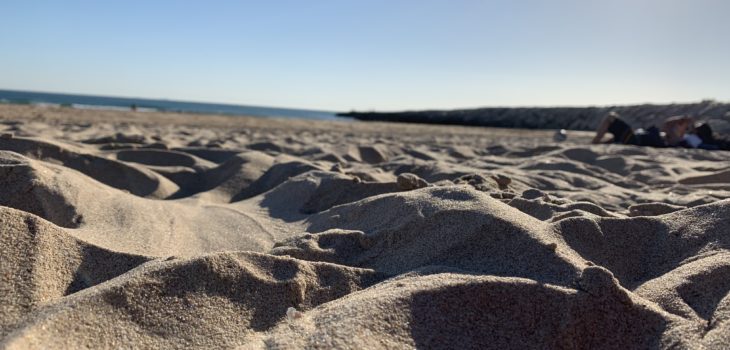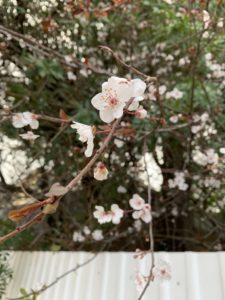
Talk about the weather: Hot, cold or extreme, it’s…
Talk about the weather? Hot. Hot as hell in Europe. Tabloid-style headlines were paired with red-and-orange heat maps and pictures of melting bicycles, people queued at swimming pools and naked men riding mopeds.
(OK, to be fair, it was one naked man on the Autobahn, but still. You can’t unsee that.)
Extreme weather — heat, cold, snow, rain, storms — always makes the news. Maybe it’s because the weather is one thing we all have in common. No matter where we live, we have weather, and sometimes it’s extreme.
So we talk about it. And write about it. And report on it.
Write weather stories
My first weather-related story came when I was interviewing for a reporter position. The city editor plunked me down at his desk in front of a manual typewriter. Not electric. Old-school, bang-on-the-keys typewriter.
“Write a weather story,” he demanded. “Just make it up.”
It was the first and last time I ever was told to “just make it up” as it related to a newspaper story.
I assumed he wanted creativity mixed with good journalism, so I crafted a weather story about how hot it was (it was August), complete with quotes from “sources” and an anecdote to lead it off.
A couple of paragraphs into it, he stopped me. I thought I’d done well. I got a job offer before I left the building.
It wasn’t until much later that I learned the truth about the “writing test.” It actually was a typing test. They had hired someone who couldn’t type, and they didn’t want to make that mistake again.
The old-school typewriter was the city editor’s favorite tool. He typed all of the story budgets and assignments on it as he had for years. It was perfect for making sure newbies could do more than hunt and peck.
During the years, I wrote plenty of weather stories. Probably all journalists have throughout their careers. Bet if you go back, even Woodward and Bernstein have clips in the archives related to the weather.
Journalists write about it, because people talk about it. And complain about it.
Complain about the weather
Living in Wisconsin extremes for most of my life, I realized people liked to complain about the weather. They would grouse when it was snowy and cold, and then they’d complain when it was hot and humid. Several years ago, I decided I couldn’t have it both ways. I could complain about one or the other, but not both. Because I actually like the heat (and humidity and sun) and dislike the cold (and snow and darkness), I chose to not complain when summer rolled around. I also liked to remind people that just a few months before they were complaining that it was too cold …
But I understand, we’d all like it to be our perfect temperature all the time. We don’t all choose to live in places where that’s possible.
Even living in Tennessee, people don’t care for the high heat and humidity. I will admit, I’ve even remarked on it. One day, I went for a walk. It was 76 (24 C) — a great temperature. The humidity was so high, I was dripping by the time I was done with my walk. I don’t plan walks or bike rides during the late afternoon, simply because it’s too warm to be enjoyable.
However, I’d still rather have this than the cold. Winters here are mild, with rain, very occasional snow flurries and temperatures that usually stay above freezing. Mornings and evenings are quite lovely, and we enjoy a lot of sun.
Talk about perfect weather
Few places have perfect year-round weather. In the northern hemisphere, the further north you go, the colder your winters. Head south, and your summers really heat up.

Of course, there are other factors. Elevation, bodies of water, jet stream and more affect weather patterns around the globe.
Finding a place with good weather wasn’t necessarily my goal when I moved to Portugal. But it sure was nice.
I got there in March for a lovely spring. After all those years of Wisconsin springs, a real spring was welcome. In Lisbon, I experienced mild temps, blooming flowers and some rain. No snow or freezing temps, and no mud or floods from melting snow.
People who live in Portugal don’t always appreciate it. I was in short sleeves with bare legs, and they were in parkas, complaining it was too cold.
It’s perspective. By the time I left, I’d learned to wear tights, unless it was going to be above 85 (30 C), and always take a sweater when I left the house, because no matter how hot it feels then, I’ll want it at some point.
Portugal was not experiencing the recent heat wave that affected much of Western Europe. Maybe it’s because of its location on the Atlantic. Even the Algarve in the south, which usually is warm, was not unusually so.
There are times when Portugal has its share of hot, cold or rainy weather. It’s just not as often nor as extreme as other places.
Big weather difference
One big difference when it comes to extreme weather between Europe and the US is the lack of air conditioning in much Europe, Portugal included. Many homes and businesses don’t have it. If you go into a shop or restaurant, you will be out of the sun, and it may be cooler, but it’s not cold. Any place that has AC is sure to advertise it.
It reminds me of when I was a kid, before “central air” became common in new homes or was added to many older ones. We relied on fans to create a wind-chill effect on us. At night, we opened windows and used fans to pull in cool night air. In the morning, we closed the windows, pulled the shades or blinds and blocked out as much sun and heat as we could.
Now, most of us in the US can stay inside in climate-controlled homes when the weather gets too hot.
Not everyone is as lucky. Instead, they need to look for ways to cool off. The pool and beach are popular but not accessible for everyone.
Extremely high temperatures for an extended time can be dangerous. Tiny apartments can turn into ovens, no matter where they are in the world.
Even though I like summer and warmer weather, I feel for those stuck in extreme heat. It will return to normal temperatures, but until then, people will have to find ways to stay cool.
And, we’ll all continue to talk about the weather.
How to Be a Better Writer Tip
Choose an instrument
I’ve suggested you try writing in a different way to spark creativity. For instance, if you usually use your laptop, try writing on paper instead.
This tip continues on that topic: If you write with pen and paper, or if you want to try it, choose a nice writing instrument.
While you can use any old pen, pencil, marker or whatever, you’ll enjoy the experience more if you choose a nice writing instrument.
Think back to elementary school when you got new school supplies. Wasn’t it neat to have new pencils, with sharp tips and erasers intact?
Now, when I occasionally use a pencil, I enjoy a mechanical one. There’s no need to sharpen it, and my preferred mechanical pencil has a nice grip on it, so it feels good.
As for pens, you can choose various tip sizes, colors and types of ink, from standard ink to gels in all colors of the rainbow. You probably already know your favorite type of pen, but if you’re still using a basic Bic, you might want to explore your options.
Recently, I restarted writing in my journal. I was using my regular style of pen, but it didn’t seem right. Then, I remembered: The friend who gave me the journal also gave me a matching pen. When I found it, I see it has a tiny tip — much finer than my regular gel ink pen. Voila! My journal writing feels right again.
Putting pen to paper should be a pleasant experience. Make it so with a nice pen.




2 COMMENTS
Hey there. If you still have my book, check out “Weather to be”, p. 185 for my less intelligent weather story than yours. All the best, Gib Check
Thanks, Gib! 🙂